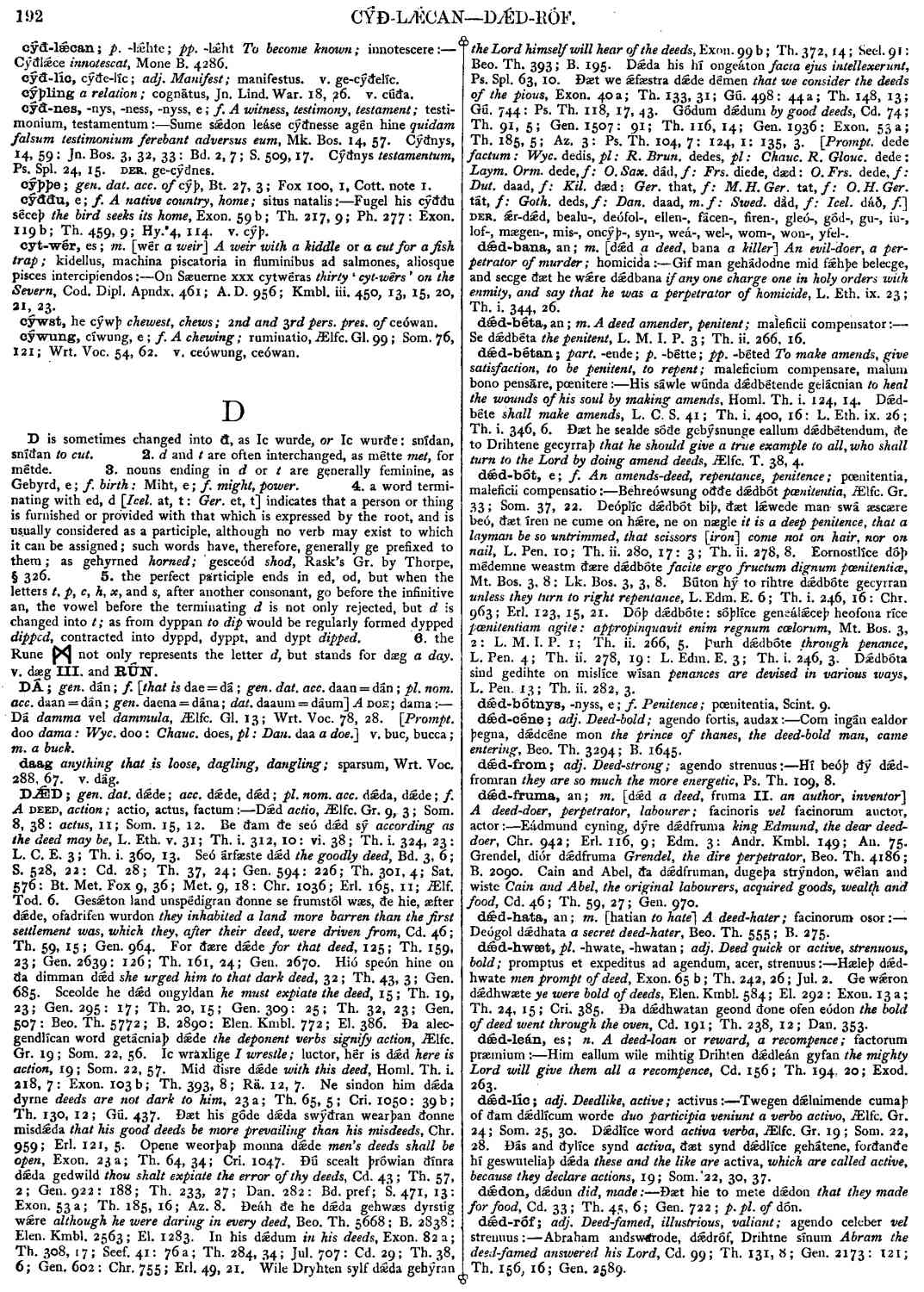DǼD
- noun [ feminine ]
-
Dǽd actio, Ælfc. Gr. 9, 3; Som. 8, 38:
actus,
- 11 ;
- Som. 15, 12.
-
Be ðam ðe seó dǽd sý
according as the deed may be,
- L. Eth. v. 31 ;
- Th. i. 312, 10: vi. 38 ;
- Th. i. 324, 23: L. C. E. 3 ;
- Th. i. 360, 13.
-
Seó árfæste dǽd
the goodly deed,
- Bd. 3, 6;
- S. 528, 22: Cd. 28 ;
- Th. 37, 24; Gen. 594: 226 ;
- Th. 301, 4; Sat. 576: Bt. Met. Fox 9, 36; Met. 9, 18: Chr. 1036 ;
- Erl. 165, 11;
- Ælf. Tod. 6 .
-
Gesǽton land unspédigran ðonne se frumstól wæs, ðe hie, æfter dǽde, ofadrifen wurdon
they inhabited a land more barren than the first settlement was, which they, after their deed, were driven from,
- Cd. 46 ;
- Th. 59, 15;
- Gen. 964 .
-
For ðære dǽde
for that deed,
- 125 ;
- Th. 159, 23;
- Gen. 2639: 126 ;
- Th. 161, 24;
- Gen. 2670 .
-
Hió speón hine on ða dimman dǽd
she urged him to that dark deed,
- 32 ;
- Th. 43, 3;
- Gen. 685 .
-
Sceolde he dǽd ongyldan
he must expiate the deed,
- 15 ;
- Th. 19, 23;
- Gen. 295: 17 ;
- Th. 20, 15;
- Gen. 309: 25 ;
- Th. 32, 23;
- Gen. 507: Beo. Th. 5772 ;
- B. 2890: Elen. Kmbl. 772 ;
- El. 386 .
-
Ða alecgendlícan word getácniaþ dǽde
the deponent verbs signify action,
- Ælfc. Gr. 19 ;
- Som. 22, 56.
-
Ic wraxlige I wrestle; luctor, hér is dǽd
here is action,
- 19 ;
- Som. 22, 57.
-
Mid ðisre dǽde
with this deed,
- Homl. Th. i. 218, 7: Exon. 103 b ;
- Th. 393, 8;
- Rä. 12, 7.
-
Ne sindon him dǽda dyrne
deeds are not dark to him,
23 a;- Th. 65, 5;
- Cri. 1050: 39 b ;
- Th. 130, 12;
- Gú. 437 .
-
Ðæt his góde dǽda swýðran wearþan ðonne misdǽda
that his good deeds be more prevailing than his misdeeds,
- Chr. 959 ;
- Erl. 121, 5.
-
Opene weorþaþ monna dǽde
men's deeds shall be open,
- Exon. 23 a ;
- Th. 64, 34;
- Cri. 1047 .
-
Ðú scealt þrówian ðínra dǽda gedwild
thou shalt expiate the error of thy deeds,
- Cd. 43 ;
- Th. 57, 2;
- Gen. 922: 188 ;
- Th. 233, 27;
- Dan. 282: Bd. pref ;
- S. 471, 13: Exon. 53 a ;
- Th. 185, 16;
- Az. 8 .
-
Ðeáh ðe he dǽda gehwæs dyrstig wǽre
although he were daring in every deed,
- Beo. Th. 5668 ;
- B. 2838: Elen. Kmbl. 2563 ;
- El. 1283 .
-
In his dǽdum
in his deeds,
- Exon. 82 a ;
- Th. 308, 17;
- Seef. 41: 76 a ;
- Th. 284, 34;
- Jul. 707: Cd. 29 ;
- Th. 38, 6;
- Gen. 602: Chr. 755 ;
- Erl. 49, 21.
-
Wile Dryhten sylf dǽda gehýran
the Lord himself will hear of the deeds,
- Exon. 99 b ;
- Th. 372, 14;
- Seel. 91: Beo. Th. 393 ;
- B. 195 .
-
Dǽda his hí ongeáton
facta ejus intellexerunt,
- Ps. Spl. 63, 10.
-
Ðæt we ǽfæstra dǽde démen
that we consider the deeds of the pious,
- Exon. 40 a ;
- Th. 133, 31;
- Gú. 498: 44 a ;
- Th. 148, 13;
- Gú. 744: Ps. Th. 118, 17, 43.
-
Gódum dǽdum
by good deeds,
- Cd. 74 ;
- Th. 91, 5;
- Gen. 1507: 91 ;
- Th. 116, 14;
- Gen. 1936: Exon. 53 a ;
- Tb. 185, 5;
- Az. 3: Ps. Th. 104, 7: 124, 1: 135, 3.
Bosworth, Joseph. “DǼD.” In An Anglo-Saxon Dictionary Online, edited by Thomas Northcote Toller, Christ Sean, and Ondřej Tichy. Prague: Faculty of Arts, Charles University, 2014. https://bosworthtoller.com/7309.
Checked: 1